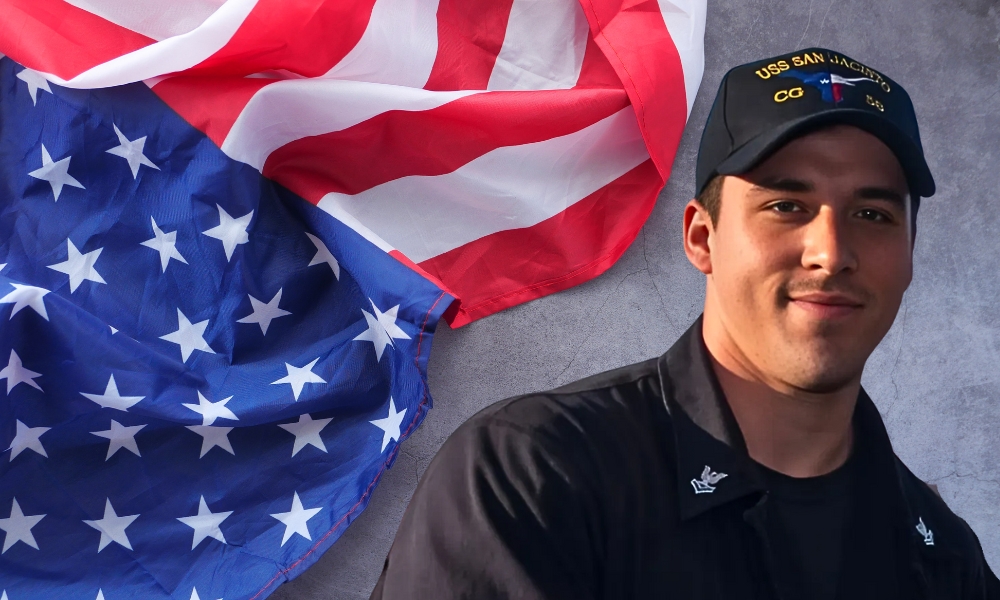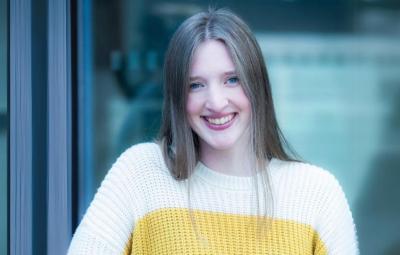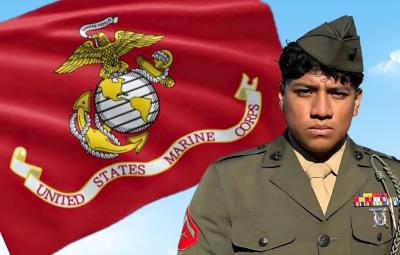
Military Rank: U.S. Navy Petty Officer Second Class E5 (retired)
Current Job Role: Ambassador, Hope for the Warriors
Major: B.S. in Criminal Justice
Program: Military and Veteran Services
Mentors: Richard Pusateri; Joshua Sooklal ’25
Hometown: Wichita Falls, TX
Career Aspiration: Union Leader
What was life like before John Jay?
I grew up in Wichita Falls, Texas. I earned straight A’s in school, was the quarterback and a linebacker for my high school football team, and went to church every Wednesday and Sunday. Both my parents worked in public service. My dad was a law enforcement officer for over 30 years, working his way up to captain in the sheriff’s department before retiring. My mom worked in healthcare as an administrator.
Why John Jay?
After retiring from the Navy, I was at a point where I needed a fresh start. I came to the city, visited a bunch of colleges, and when I got to John Jay and met Richard Pusateri, the Military and Veteran Services’ team, and the members of the Veteran’s Association, I knew that John Jay was where I belonged. He and his staff provided me with a step-by-step roadmap to success, and they made me, a non-traditional student with a military background, feel like I was home.
Why were you interested in joining the U.S. Navy?
Aside from my parents working in public service, many people in my family were in the military, either in the U.S. Army or the U.S. Navy, so I think it was a natural step for me to join the military. Also, I grew up in a small town, and my ambitions always extended beyond the town’s limits. I knew I didn’t want to stay in Wichita Falls forever, so I joined the U.S. Navy. I loved serving this country for six years. I spent three and a half years on the water, protecting this nation, and was fortunate to travel to over 20 countries. I even embarked on diplomatic missions where I got to meet royalty.
What was your role while on active duty?
I was a U.S. Navy cryptologic technician technical working on anti-ship missile defense. While deployed, my job on board the ship was to detect threats. I was stationed in the Persian Gulf and prevented many attacks. If I detected a threat coming from another ship, plane, or shore, my job was to analyze the threat.
How did your mentors help put you on the path to success?
I’ve learned so much from Josh Sooklal, an Iraq war veteran, John Jay student, and Hope for the Warriors director. We met during a Veteran Association’s meeting here at John Jay. He asked me if I needed help, and I told him how giving back to the military and veteran community is so important to me. Josh introduced me to Hope for the Warriors and helped me become an ambassador for the organization. He’s also looked out for me outside of campus, connecting me to good programs and people. He’s also been great at helping me navigate life here in the city because he’s originally from Queens.
How has your military experience enhanced your academic experience?
Being all over the world allowed me to gain a good grasp on different cultures, see how others live, and appreciate how fortunate we are to live in such a diverse country. So, I like to share that international perspective during class. Especially when looking at criminal justice in this country, it’s important to understand someone’s cultural background and how that shapes their experience and could possibly lead to where they are today. Understanding these differences can help us create a more just society.
What was the most rewarding about your military service?
I loved constantly being challenged because it made me grow up quickly and become the man I am today. I remember being 22 years old, sitting in a room with CIA agents and Navy seals, answering mission-related questions that could save their lives. In the military, you learn to be super responsible, accountable, and attentive very quickly. One of my proudest achievements in the Navy was passing threat recognition tests. You’re given thousands of missiles to study in a very short period. It’s a challenging course but I passed it each time.
What would you tell military servicemembers or veterans considering attending John Jay?
No other college in New York City, or across the United States, gives such dedicated support to its military and veteran students. At John Jay, you get exactly what you need as a military servicemember or veteran to succeed academically and in life. You’re connected to career opportunities and programs that help you thrive.
Where do you see yourself in the future?
I’m currently in the Helmets to Hardhats Program, which gives military service members and veterans access to careers in New York’s building trades and construction unions. I hope to be a union electrician and work my way up to the board of directors or a supervisor for one of the big unions in the city, overseeing contracts and running new developments across the city. With my military background and John Jay education, I know I’ll bring discipline, fairness, and understanding to any role.



